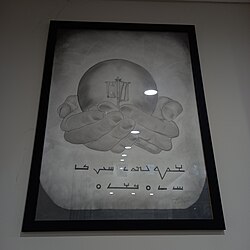Bshuma



The second line reads:
لوفا و ارواها اد هیی (laufa u-ruaha ḏ-hiia; "May laufa (communion) and a renewal of Life")
و شاوق هطایی (u-šabiq haṭaiia; "and forgiveness of sins")
| Part of a series on |
| Mandaeism |
|---|
 |
| Religion portal |
In Mandaeism, the bshuma (Classical Mandaic: ࡁࡔࡅࡌࡀ, romanized: b-šuma, lit. 'in the name [of]') is a religious formula that is often written at the beginnings of chapters in Mandaean texts and prayers.[1][2] The Islamic equivalent is the basmala.
The full form of the bshuma is "In the name of Hayyi Rabbi" (Classical Mandaic: ࡁࡔࡅࡌࡀࡉࡄࡅࡍ ࡖࡄࡉࡉࡀ ࡓࡁࡉࡀ, romanized: b-šumaihun ḏ-hiia rbia, lit. 'In the names of the Great Life'; modern Mandaic pronunciation: /biʃˈmeihon əd-ˈheiji ˈrɑbbi/; Arabic: باسم الحي العظيم, bism al-Ḥayy al-ʿAẓīm).[3]
A simpler version is ࡁࡔࡅࡌࡀ ࡖࡄࡉࡉࡀ (b-šuma ḏ-hiia; modern Mandaic pronunciation: /ˈbiʃmɑd-ˈheiji/), which literally translates to "In Life's name."[4]
Related formulas
At the ends of Mandaean prayers and texts, the following formulas are often recited to conclude the prayer or text.[4]
- "And Hayyi is victorious" (Classical Mandaic: ࡅࡄࡉࡉࡀ ࡆࡀࡊࡉࡍ, romanized: u-hiia zakin)
- "And praise be to Hayyi" (Classical Mandaic: ࡅࡌࡔࡀࡁࡉࡍ ࡄࡉࡉࡀ, romanized: u-mšabin hiia)
See also
References
- ^ Buckley, Jorunn Jacobsen (2002). The Mandaeans: ancient texts and modern people. New York: Oxford University Press. ISBN 0-19-515385-5. OCLC 65198443.
- ^ Aldihisi, Sabah (2008). The story of creation in the Mandaean holy book in the Ginza Rba (PhD). University College London.
- ^ Gelbert, Carlos (2011). Ginza Rba. Sydney: Living Water Books. ISBN 9780958034630.
- ^ a b Drower, E. S. (1959). The Canonical Prayerbook of the Mandaeans. Leiden: E. J. Brill.

